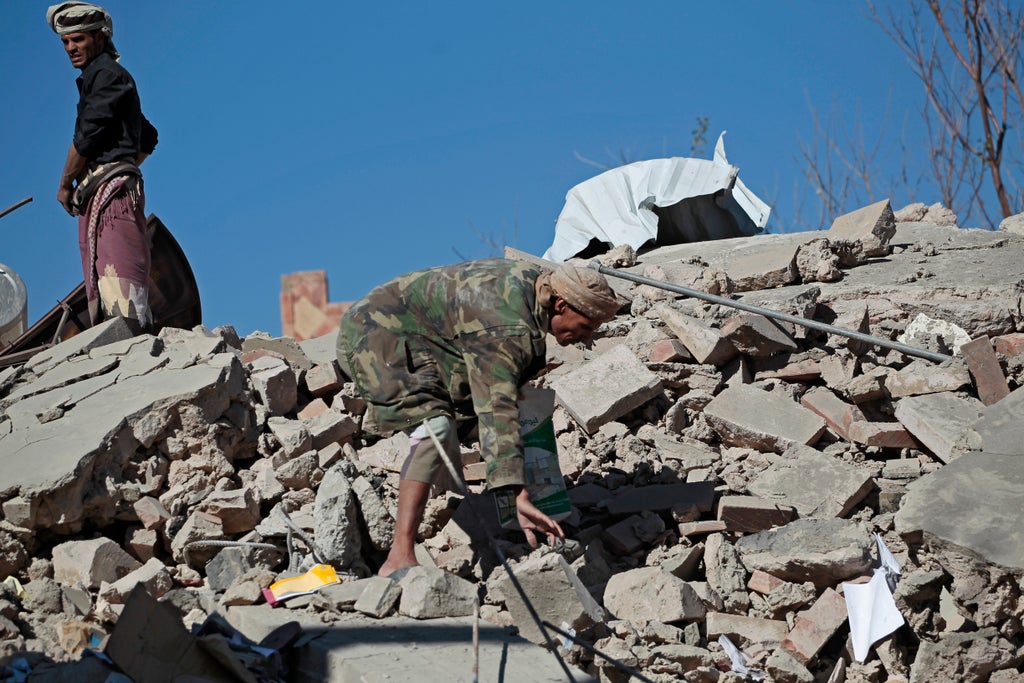
As many as 20 people have reportedly been killed in the Yemeni capital of Sanaa in Gulf coalition airstrikes on Houthi positions, just hours after the rebel group launched a deadly missile strike on the United Arab Emirates.
Early on Tuesday, Saudi state media reported that the Gulf coalition had begun bombing Houthi strongholds and camps in Sanaa after the Houthis claimed to have hit Abu Dhabi in an attack that killed three people and injured six more. The coalition, which has been fighting the Houthis in Yemen since 2015, said it also intercepted eight drones fired toward Saudi Arabia on the same day.
Houthi deputy foreign minister Hussein el-Ezzi tweeted on Tuesday that the overnight coalition strikes killed nearly 20 civilians including women and children. If the death toll is accurate it would make it the deadliest attack on the Yemeni capital in nearly three years.
Local residents and medics in Sanaa told The Independent around 14 people had perished in one of the strikes when aircraft struck the home of a high-ranking Houthi official in a central district of the capital.
The Houthis named the official as Abdullah Qassim al-Junaid, who is head of the Aviation and Air Defense college in Sanaa. He is also believed to be among over 170 Houthi members sentenced to death by a court run by the recognised Yemeni government.
Local reporters, residents and a medic told The Independent the strike that killed al-Junaid also killed his wife, his son, several of his nephews and his daughter in law. Four other members of the family, including women, are reportedly in intensive care.
Yemen has been in the grips of a bloody civil war since 2014 when the Houthi rebels swept control of swathes of the country ousting the recognised president Abed Rabbo Mansour Hadi - a key Gulf ally. Saudi Arabia and its Gulf partners including the UAE launched a bombing campaign in 2015 followed by a ground invasion to re-install their ally.
But seven years on there is little hope of an end to the fighting, which has killed at least a quarter of a million people according to the United Nations. It has sparked the world’s worst humanitarian crisis in terms of numbers, including pushing millions to the brink of famine.
On Tuesday in Sanaa aid workers frantically searched for survivors in the rubble, which was strewn with belongings and debris from heavily damaged neighbouring houses.
At the scene of one of the strikes, Ahmad al-Ahdal said his uncle’s house was hit after the strike on Junaid’s home.
"My uncle went in with rescuers to extract the victims in Junaid’s house," he told Reuters. "We have been unable to find him since then."
The strikes on Sanaa come after the Houthis claimed what it called a “spectacular” drone attack on Emirati oil facilities and the Abu Dhabi International Airport.
The UAE said the attack killed two Indian nationals and a Pakistani citizen as several tankers at the site exploded.
The extraordinary move which struck deep into the UAE marked a serious escalation in the bloody seven-year conflict and threatened to drag Abu Dhabi further into the war.
The Emirati foreign ministry said in a statement that those responsible for the attack “will be held accountable”. It added that “the UAE reserves the right to respond to these terrorist attacks and criminal escalation, describing them as crimes committed in flagrant violation of international law.”
The Independent reached out to the ministry for further comment but has yet to receive a reply.
Israel, which normalised relations with the UAE in 2020, offered security and intelligence support against further drone attacks from the Houthis.
On Twitter, Israeli Prime Minister Naftali Bennett condemned what he described as a "terrorist drone attack".
In recent months the fighting in Yemen has raged around the central energy-rich province of Marib.
Last week the Saudi-led coalition announced a new operation aimed at breaking a deadlock in the centre of the country. It came after the recently redeployed UAE-backed Giants Brigade forces, supported by airstrikes, expelled Houthi forces from oil-producing Shabwa, reopening a corridor of access.
The UAE-backed and trained Brigades first entered the central province last Monday and have since seized large parts of Huraib district, local military sources said.
The renewed fighting has dashed hopes of a speedy resolution to the crisis. Over the past mont the UN said more than 15,000 people have been displaced because of fighting in al-Jawf in the north, Marib in central Yemen and Shabwa in the south.
Aid workers in Sanaa who could not be named for security reasons told The Independent that Tuesday’s strikes on the capital were a culmination of a serious increase in airstrikes on northern Yemen.
The aid workers said airstrikes had also hit telecommunications antennas and on Saturday struck a major water tank, leaving 120,000 people without water in the northern city of Saada.
They said fighting has also caused major fuel shortages which have seen the price of petrol soar eightfold.
Earlier this week Yemen Data Project released an update revealing a surge in coalition air strikes and civilian casualties in December, with 32 civilians killed and 62 injured.







